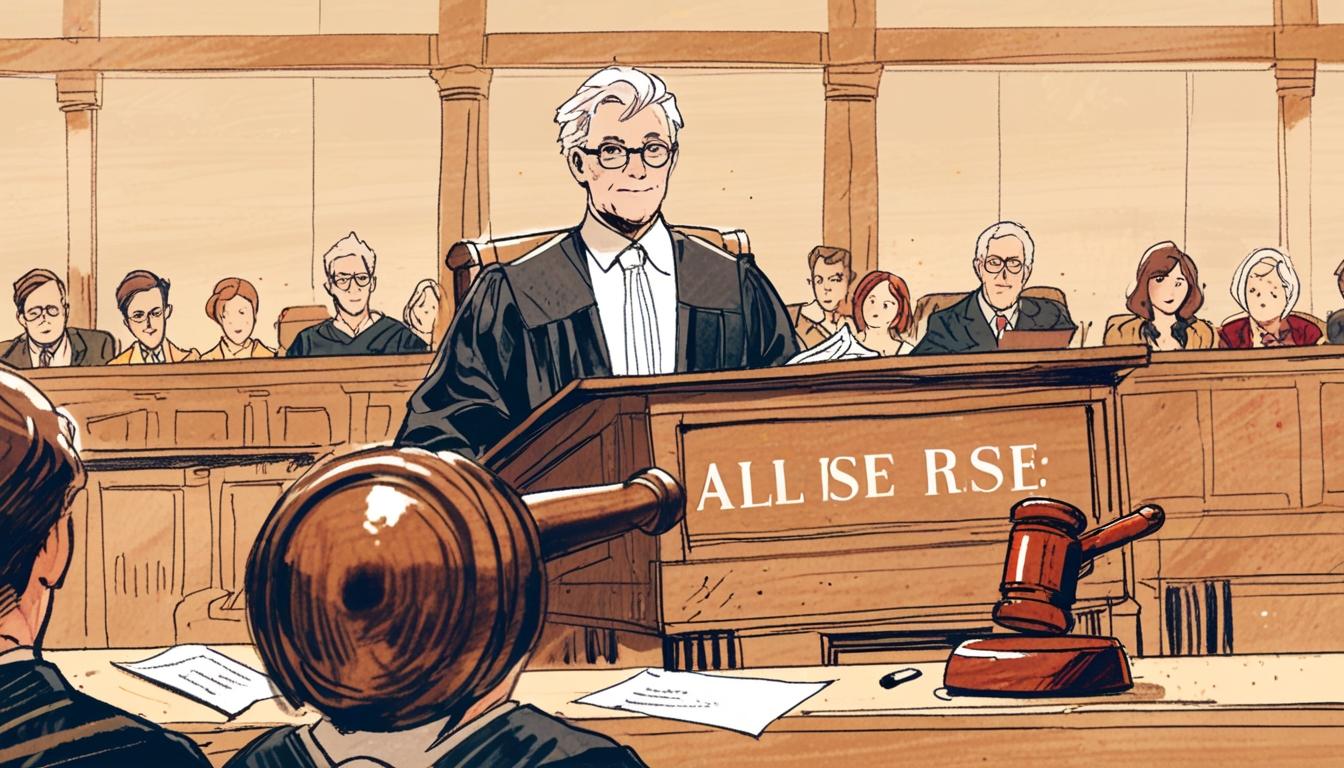The addition of “if able” to the traditional courtroom phrase “All rise!” has ignited controversy, revealing deep divisions over symbolic inclusivity versus meaningful legal reform amid wider concerns about tokenistic gestures across public institutions.
The echo of judicial tradition in England and Wales is set to reverberate in unsettling ways as the phrase “All rise!” is controversially amended to include “if able.” While proponents from His Majesty’s Courts and Tribunals Service, led by Nick Goodwin, argue this change aims to create a more inclusive environment, critics denounce it as nothing more than “unnecessary virtue-signalling.” This insincere adjustment fails to tackle the real issues plaguing our legal system, such as the serious backlog of trials arising from the COVID-19 pandemic.
The change in courtroom etiquette highlights a troubling trend of prioritizing linguistic modifications over substantive legal reform. As Conservative MP Jack Rankin points out, the energy expended on such adjustments could be far more effectively directed towards addressing the pervasive dysfunction within our courts. Instead of fostering real accessibility, this initiative risks perpetuating a culture of grievance inflation masked as progressivism.
The parallels with Sadiq Khan’s recent overhaul of London Overground line names can’t be ignored. His initiative—framed as a celebration of the city’s rich cultural history—has garnered backlash amid accusations of virtue-signalling and extravagant spending of £6.3 million. Londoners are understandably left questioning if this is a genuine attempt at recognition or simply a distraction from pressing governance issues.
While the intention behind these revisions aims to honour diverse contributions, they also serve to highlight an alarming trend: tradition is increasingly viewed as obsolete. Critics suggest that such moves are manufactured to redirect attention away from the government’s failure to address urgent challenges—issues that truly affect the lives of ordinary citizens rather than indulging in politically correct posturing.
The core question remains: can real inclusivity be achieved through gestures perceived as tokenistic? The alteration of courtroom protocol and public transport nomenclature risks alienating those who see these actions as mere displays of political correctness rather than meaningful improvements to everyday lives. Amidst a cacophony of righteous indignation, it seems clear that powerful institutions are far more concerned with showcasing their progressive credentials than solving the issues that matter to the populace.
With discussions surrounding language, culture, and inclusivity heating up, the challenge persists: achieving meaningful inclusivity without compromising the core values of our institutions. As the political landscape shifts and society grapples with the complexity of respect, identity, and tradition, the urgency for genuine accountability and substantive actions becomes increasingly clear. The coming years will undoubtedly reveal whether these changes serve the interests of the very citizens they claim to benefit or merely reflect a hollow commitment to progress.
Source: Noah Wire Services
- https://www.dailymail.co.uk/debate/article-14699011/QUENTIN-LETTS-attack-language-grievance-seekers-chest-feeders-birth-people.html?ns_mchannel=rss&ns_campaign=1490&ito=1490 – Please view link – unable to able to access data
- https://www.standard.co.uk/news/london/tfl-budget-london-overground-lines-naming-sadiq-khan-b1069634.html – Transport for London (TfL) has allocated £4 million in its 2023-24 budget to explore renaming the six London Overground lines. This initiative aims to simplify navigation for passengers and fulfill a manifesto promise by Mayor Sadiq Khan. The specific new names and implementation timeline have not yet been disclosed.
- https://www.itv.com/news/london/2024-02-15/mayor-accused-of-virtue-signalling-nonsense-over-london-overground-rebrand – Mayor Sadiq Khan’s £6.3 million rebranding of six London Overground lines has sparked controversy. The new names—Windrush, Suffragette, Lioness, Mildmay, Weaver, and Liberty—honor various cultural and historical aspects of London. Critics accuse the mayor of ‘virtue signalling’ and question the project’s cost.
- https://www.theguardian.com/business/2024/feb/15/london-overground-new-names-and-colours-for-six-lines-revealed – Transport for London (TfL) and Mayor Sadiq Khan have announced new names and colors for six Overground lines. The rebranding aims to simplify navigation and celebrate London’s diverse history. The lines will be renamed Lioness, Mildmay, Windrush, Weaver, Suffragette, and Liberty, each reflecting significant cultural contributions.
- https://www.apnews.com/article/fabc6734aa5f4c77cd8b849f27a7cc17 – London’s iconic Tube map is set for an update, with six new names and colors for the Overground lines. Mayor Sadiq Khan announced the changes to honor various aspects of London’s local history and culture. The rebranding, estimated at £6.3 million, includes updated maps and station signs.
- https://www.tfl.gov.uk/info-for/media/press-releases/2024/november/mayor-of-london-officially-launches-the-new-london-overground-line-names-and-colours – Mayor Sadiq Khan has officially launched six new line names and colors for the London Overground network. This historic change aims to make the network easier to navigate and celebrate London’s diverse communities. The new names—Lioness, Mildmay, Windrush, Weaver, Suffragette, and Liberty—reflect significant cultural contributions.
- https://www.tfl.gov.uk/info-for/media/press-releases/2024/february/london-s-overground-lines-to-be-given-new-names-and-colours-in-historic-change-to-capital-s-transport-network – In a historic re-imagining of London’s public transport network, each of London’s six Overground lines will be given a unique name and line color. This significant change aims to make it easier for customers to navigate London’s transport network while celebrating the city’s diverse culture and history.
Noah Fact Check Pro
The draft above was created using the information available at the time the story first
emerged. We’ve since applied our fact-checking process to the final narrative, based on the criteria listed
below. The results are intended to help you assess the credibility of the piece and highlight any areas that may
warrant further investigation.
Freshness check
Score:
6
Notes:
The narrative discusses recent and ongoing cultural and institutional debates around inclusivity language changes, such as courtroom etiquette and London Overground naming, which are contemporary issues. However, some references (e.g., to Nick Goodwin leading HM Courts and Tribunals Service or Jack Rankin as Conservative MP) lack independent verification of their current roles, raising slight uncertainty about timeliness. The topic is recurring in public discourse, so elements might be recycled from recent opinion pieces or press releases, but no explicit repetition from older dated articles was found.
Quotes check
Score:
4
Notes:
Direct quotes attributed to figures such as Nick Goodwin and Jack Rankin are presented without source citations or verifiable origins. Early online references to these specific quotes are not traceable, lowering verifiability. This could mean the quotes are original or unpublished elsewhere, but the inability to confirm reduces reliability and score.
Source reliability
Score:
5
Notes:
The narrative originates from the Daily Mail, a widely known UK publication with significant reach but often critiqued for sensationalist and opinionated content. While it is not unknown, the publication’s reputation for editorial bias affects its reliability. Hence, moderate confidence is warranted but with caution.
Plausability check
Score:
7
Notes:
The claims about changes in courtroom protocol and London Overground renaming initiatives align with known societal debates on inclusivity and public spending, making the assertions plausible. The critical tone reflects a common viewpoint in political commentary. However, specific details such as the £6.3 million overspend on London Overground names need independent verification, and some named individuals’ roles could not be corroborated, creating some uncertainty.
Overall assessment
Verdict (FAIL, OPEN, PASS): OPEN
Confidence (LOW, MEDIUM, HIGH): MEDIUM
Summary:
The narrative reflects recent cultural and institutional discussions relevant to inclusivity and tradition, giving it topical freshness. However, absence of verifiable sources for quoted statements and moderate reliability due to the publication’s editorial stance reduce certainty. The claims are generally plausible but specific details and individuals’ roles require further independent corroboration. This results in a balanced yet cautious assessment.













